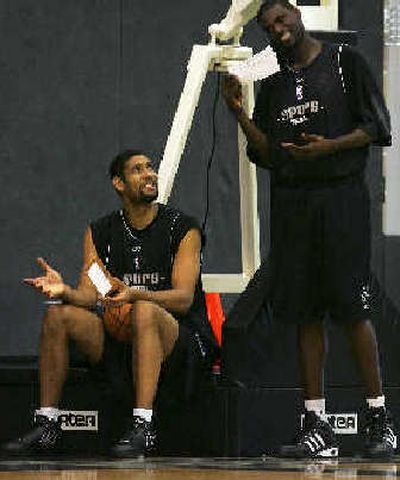All is right in Duncan’s world again

The NBA Finals begin tonight, or, as Tim Duncan might rename them, “How to Go From On-Court Infamy to Ecstasy in Less Than a Year.”
The closer another title, the easier it is for Duncan to distance himself from last spring and summer, when the game flat-out did him wrong.
It began last May with that crazy, catch-turn-and-fire shot by Derek Fisher – the one that nullified his own game-winning, Game 5 buzzer-beater and sent the Lakers, not Duncan’s San Antonio Spurs, back to the NBA Finals.
His 2004 of discontent continued with the Olympics, essentially a two-week, tour de farce for American basketball. Duncan’s teammates could not shoot and Duncan was called for fouls he never was whistled for in the NBA. He fouled out twice in eight international games after fouling out twice in his eight-year NBA career.
St. Croix’s favorite son kept a two-year commitment to the United States when lesser players from the 48 contiguous states would not even make one. For that, he earned a bronze medal and became part of U.S. hoops infamy – the first team of NBA players to lose at the Games.
Between the calls and the negative drama surrounding his team, he called his international career “95 percent” finished. In an uncharacteristic show of off-court emotion, Duncan added, “FIBA (stinks),” referring to the sport’s international governing body.
“Do you think your negative Olympic experience will make other great players want to stay away?” he was asked in Athens.
“I hope not,” Duncan said. “I’ll try not to share my experiences with anyone.”
Disenchanted might be strong, but the man did not enjoy playing basketball at that moment. Complaining about the past is not in his demeanor, so on the eve of Game 1 of the NBA Finals – between his Spurs and the defending NBA champion Detroit Pistons – it’s best to go elsewhere to get the dope on Duncan.
“It was tough for him in the Olympics,” said Steve Kerr, Duncan’s former teammate and now a television analyst for TNT. “He was called for every little thing. The high screens he’d set in the NBA suddenly became fouls. With everything going on over there, let’s just say he was happy to get back.”
How Duncan recrafted his playing legacy and switched up on history in months is impressive. No one even mentions the Olympic debacle anymore. All they talk about is how good Duncan can still be.
Think about it. Hakeem Olajuwon was 31 years old when he won his first championship in 1994. David Robinson was two months shy of 34 when he teamed with Duncan for his first title in 1999. Shaquille O’Neal, like Michael Jordan almost a decade earlier, was only 28 when he won the first of three titles in 2000. But even Shaq had to endure four series sweeps in five years before he and Kobe Bryant finally broke through.
Future Hall of Fame pivots pay their dues, those are supposed to be the rules. Futility at the highest level is almost a rite of passage for all of the modern game’s great big men – and some still never grasp the grail (see Patrick Ewing).
Duncan, 23 when he won his first title and in his prime at 29 today, is toying with those rules. The most complete post player in pro basketball is preparing for his third NBA Finals in six years, beginning today on his home floor in San Antonio.
He is not playing Ben Wallace, Rasheed Wallace and the Pistons for the title the next two weeks as much as he is playing for the game’s annals. A third championship since 1999 would give Duncan as many gaudy, golden rings as O’Neal and Bryant the past six years.
“He’s already ahead of both Kobe and Shaq for MVP awards won,” said Kerr, who also played on a championship team with Jordan. (Duncan has won two MVPs to Shaq’s one and Kobe’s none.) “If he ties them both for championships, we have to start talking about Tim, post-Michael, as the best player of his generation.”
The only Hall of Fame player with similar credentials this early in his career is Kevin McHale, from whom Duncan seems to have borrowed much of his footwork, up-and-under and drop-step moves. McHale was 23 in 1981 when he won his first championship and 28 when he won his last in 1986. But he never won an MVP award and was often thought to be the second- or third-best player on his team behind Larry Bird and Robert Parish.
The Spurs are unquestionably Duncan’s team. Jordan was 28 when he won his first of six championships in 1991. He won his last at age 35 in 1998. Duncan’s young Spurs – Manu Ginobili is 27 and Tony Parker is 23 – have at least five years of title contention still in them.
The Spurs and their star could finish with seven or more championships before Duncan retires. It might seem sacrilege to the MJ faithful, seeing as how Duncan and his perceived vanilla game are to marketing what Kenneth Lay is to profit sharing.
But unexciting Timmy D. is closer to winning more titles than Jordan’s Bulls than any player prematurely hyped as the Air Apparent.
Some irony, right? After all the T-Macs, A.I.s, K.G.s, J-Will’s and Stevie Franchises, on many nights the most accomplished player after Jordan might have his vertical leap measured by inserting a Metro farecard under his sneakers. In-game flair or off-court earning power, Duncan is anathema to what Jordan represented and who he was as a player and pitchman.
Yet, he is everything Jordan was as a resilient competitor, a guy who did nothing more than channel his failures into championships.
It’s too bad that fact cannot sell a league anymore.